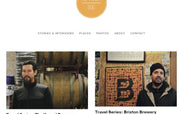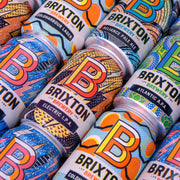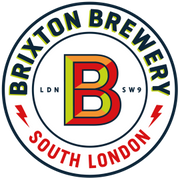
JEZ TALKS TO THIRSTY DOG ABOUT SETTING UP A BREWERY IN BRIXTON
March 23, 2016
Travel Series: Brixton Brewery
In the last few years, London has become the European hub for craft beer. The community of brewers is growing with the increased interest and demand of drinkers, but the quality of the output seems to waiver very little and craft enthusiasts from around the world are paying attention.
Brixton Brewery is only a few years old, but it’s already become an important part of the eclectic borough of Brixton. Jez Galaun, co-founder of the brewery, is fiercely loyal to this part of London and makes it quite clear that he’s in no hurry to leave the neighborhood that the brewery so happily calls home. The beer, he says, is sort of a reflection of the area. The labels pay homage to the African textile market down the street and the beer names are rooted in the culture and history of South London.
Currently, Brixton is situated in a drafty railway arch, which only adds to the charm of the brewery and what it stands for: no frills or anything too “wacky”—just consistently good beer that speaks for itself.
What’s the Brixton philosophy?
There are small micro breweries that make people proud, and for us, we wanted to make not extreme beer, nothing wacky, nothing too experimental. We wanted to take classic beer styles like an IPA, pale ale, stout and make our own interpretations of them, but we wanted to make beers that people would have them as their go-to beer—they’d know what to expect: quality, consistency, flavor, balance. So we’re not making the most hoppy beers, we’re not making the most bitter beers, we’re not chucking in every ingredient and hoping it turns out well. We’re just trying to use the four basic ingredients and get them to play together nicely and just make the best beers that we can. We don’t set out to shock or anything like that. We wanted to be that sort of local regional brewer with authenticity and representing the area that we’re from. That’s kind of the common thread through the names, the branding, the beers themselves; taking that as our philosophy.
Tell me about the London beer scene.
The year that we opened, there were a lot of brewery openings—fourteen or fifteen and there have been more planned for this year, so everything is growing; the awareness of the drinker and how discerning they are is increasing. Everyone home brews so everyone is an expert, so you’ve really got to know your game. We’re trying to catch up with the American beer scene in terms of the quality and consistency. When I say we, I’m talking about collectively in London. People are investing a lot in equipment and training their staff and I think the quality of beer coming out of London is fantastic. There are a few other cities in the UK with burgeoning beer cultures like Manchester, Bristol, places like that. But London has probably the most established breweries and it’s competitive. The theory is that the rising tide carries all boats, so you know, it’s open and friendly especially amongst your local breweries. We all help each other out. This morning a brewery from a mile down the road needed some grain, so they grabbed some of our grain and we needed some yeast last week and they gave us some yeast, so we feel camaraderie with the other London breweries. Is it kind of us against the big guys? I’m not really sure, we’re just nice people I think. I think people go into the business not necessarily to make money—clearly some do, but in general it echoes the story that I told; people didn’t like what they were doing before and now they want to do things because hopefully they’ll make some money along the way, but that’s not the primary drive. People do it because they like beer and they like socializing. It’s a story that I think you find in any brewing city. It’s great. I’ve got no regrets about doing it. Maybe sometimes in the middle of winter when you’re in a cold railway arch you question it, but it’s really great. It’s a good community.
What do you think sets London apart from other cities when it comes to beer?
I think there’s history of brewing in London, so there’s that kind of tradition. There were a lot of London-based breweries and they all moved out. I just think London is often and the forefront of anything and everything that happens in Europe, and there were pioneers like The Kernel—they were one of the first in London—and you get a lot of imitators, and we’re kind of jumping on those coattails and trying to grab onto them, but there’s money in London as well so people can get access to money to open breweries because it’s really capital-intensive to open a brewery. That’s one thing I’ve really noticed—the game has changed recently—people were opening breweries really small and not risking too much. But now the brewery openings—people are spending more on their floor than we’ve spent on our entire brewery. So that’s changed; there’s a lot of money going into brewing. You know, London has just had its second acquisition of a craft brewery by the big boys: Meantime [bought] by SAB Miller and Camden Town by InBev for £85 million [€108.8 million]. So I just think there’s a lot of venues to support a lot of breweries. We’re all trying to sell to the same customers, but not at the same time. People value variety, novelty—so you bring out a new beer, people really want to try your new beer. Next week, another brewery will bring out a new beer and they’ll really want to try that one. But also, there’s not loyalty to a particular beer which kind of flies in the face of our philosophy, which is that we want to be the go-to beer. Though obviously some people will want to drink the same, but a lot of people want to try something new. There are a lot of people that have never really drunk beer before who are getting into it, so the amount of people drinking craft beer is rising. I’d say nearly half of our customers are women. That’s something that didn’t happen in the past when I can remember drinking a fizzy lager and that kind of thing. So London is just so big it can support a lot more breweries. London is full of creative people and craft beer is a nice intersection of creativity and a few other things, so maybe that’s the reason.
What’s important for London brewers to keep in mind during this beer “gold rush”?
I would like to see more people embrace locally-made products. So obviously we’re making something that isn’t going to be as cheap as mass-produced products, but we’re hopefully providing more satisfaction and more value. I think the responsibility for us as brewery owners is that we make the best product possible. Over the last year we’ve invested in lots and lots of equipment to make sure that we’re producing the best beer possible. Because the worst that could happen is that you get lots of new breweries opening in this gold rush and their beer is crap, and then people think that craft beer actually tastes like shit. So on the brewing side, I think we need to share our education, share our expertise, share our knowledge. When we were starting out, we would go to breweries and ask questions and they would always tell us the answer—and when breweries come to us, we go out of our way to try and help them. Even the guys that are “on our turf”—the local rivals—I just don’t see it that way.
What’s next for Brixton?
To get some beer outside of London is the plan. I mentioned we’re putting some funny languages on our labels, and we’re just starting to produce more so that we can distribute outside of London. The original concept was to make beer for people in Brixton, then it went a little further and we started to supply some beer north of the river in London, and then you reach further out and you get random calls from people like in Scotland or different parts of the UK and they’re interested in trying your beer. Because of the novelty value—they want to give their customers something they haven’t tried before. We’ve had visits from people from Italy—there’s a burgeoning craft beer scene in Italy. They really want to get London-brewed beer. You know, London beer is kind of seen as sort of a brand, I guess—an unintentional brand, but London is seen as a place with lots of cool breweries and people want to try beer from London and that kind of thing. I’m also sort of wary of where our beer goes to, which is a bit stupid because of course you want to sell as much as you can, but I’d rather it went to people who appreciated it for what it was rather than what it is. I don’t want people to buy it because it’s got a pretty label, but obviously people are going to do that. I want the beer to kind of speak for itself, so that’s one thing The Kernel is saying; they’re always using these plain brown labels. They don’t do any branding or design, no tasting notes or anything like that. They don’t want to tell people what the beer is going to taste like. But, I don’t want to go to that extreme, though we’ve never had any sort of PR or anything like that. I don’t want to push the beer. I want the beer to kind of take its own natural path. In Brixton we don’t try to sell the beer to anyone. We just want people in Brixton to realize or get what we’re doing. I would rather they came to us and asked us about the beer rather than we went to them and told them about it. It doesn’t work all over London, of course. I want people to appreciate what we’re doing, to come here and see. We don’t have any dedicated or full-time salespeople, which we’re going to need because the market is very competitive now, but I just want people to order our beer because they like and they get what we’re trying to do. Which is kind of a weird dichotomy I have inside my head, because it’s like one eye on the bank account and one eye on this kind of—I haven’t fully reconciled it yet. I kind of think maybe we should be doing all of these PR stunts, but I don’t like doing it. I want it to be a beer that kind of makes its presence quietly felt. I think that’s why we don’t do anything too extreme or wacky.
Sign up for the latest news, brews and offers from Team BB
Send me personalised offers and news about the Brixton Brewery brand via email and online targeted adverts. Brixton Brewery Limited will process your data in accordance with our Privacy Policy. You can withdraw consent by clicking unsubscribe in any email or emailing protectyourdata@brixtonbrewery.com.



